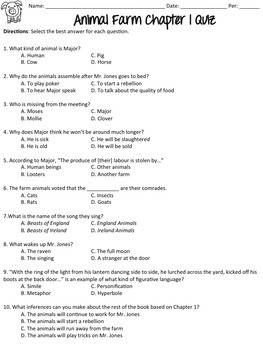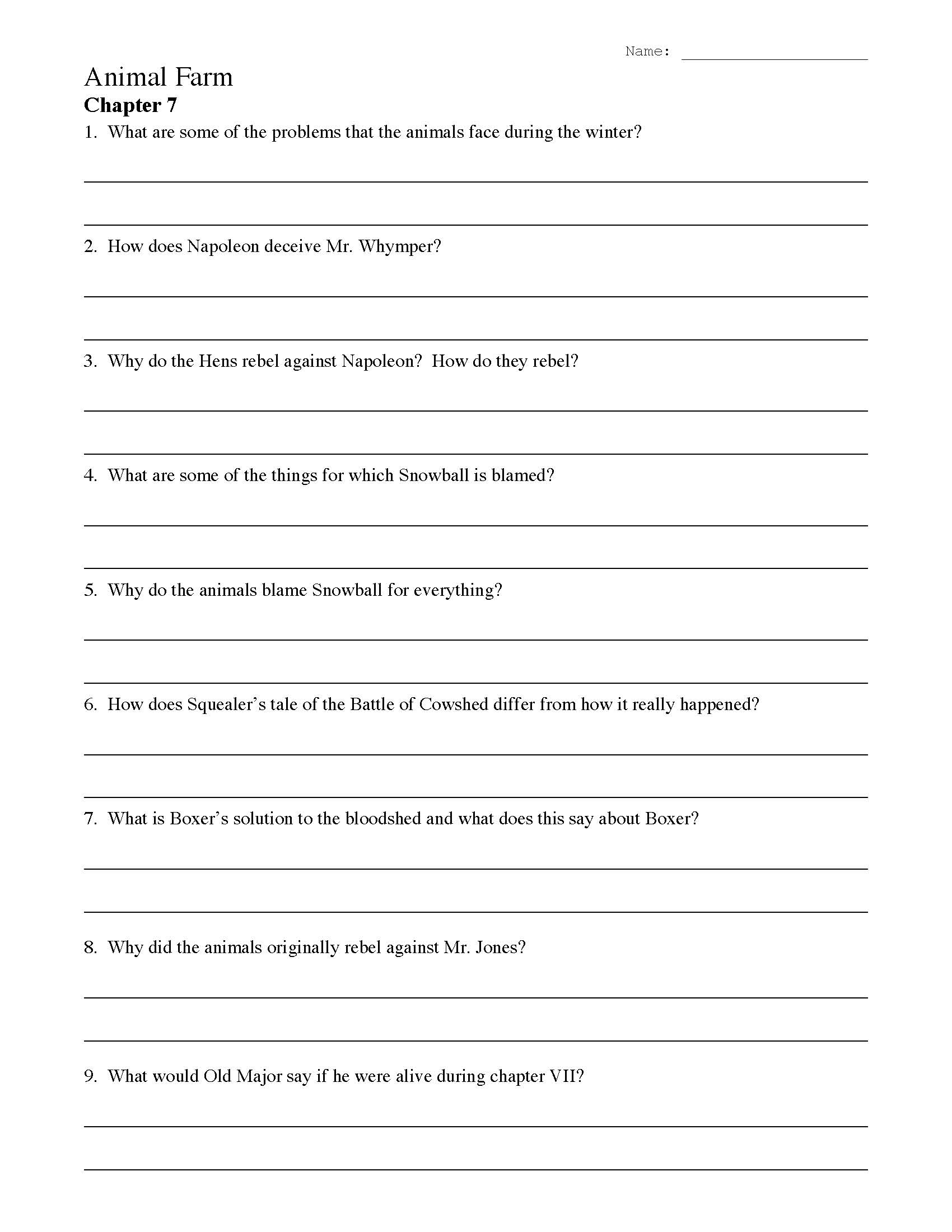Have you ever wondered why a simple fable like Animal Farm continues to resonate with readers decades after its publication? George Orwell’s masterpiece isn’t just a children’s story; it’s a powerful allegory for the dangers of political corruption and the struggle for freedom. As a high school student, I remember wrestling with the complexities of the novel, trying to decipher its layers of meaning. That’s where a good study guide came in handy. While there are many study guides available, finding one that truly captures the essence of Animal Farm can be a challenge. This article aims to serve as that guide, offering a comprehensive overview of the novel and providing you with all the tools you need to truly understand and appreciate Orwell’s chilling masterpiece.

Image: www.teacherspayteachers.com
You may be looking for a study guide to help you analyze and interpret the novel, or you might want to simply get a better understanding of the story and its characters. Whether you’re a student trying to ace your next English exam or a casual reader curious about the book’s powerful message, this study guide will help you navigate the twists and turns of Animal Farm in a way that helps you not only understand the text but also see its deeper meaning.
Analyzing the Allegory: Unveiling the Deeper Meaning of Animal Farm
At its core, Animal Farm is a political allegory, using animal characters to represent real historical events and people. The novel, set on Manor Farm, tells the story of animals who overthrow their human farmer, Mr. Jones, and establish their own society based on the principles of equality and animalism. However, the animals soon find that their utopian vision becomes corrupted by power, leading to a new form of oppression under the rule of the pigs. The novel cleverly mirrors the events of the Russian Revolution, with the pigs representing the Soviet leadership, Napoleon mirroring Stalin, and the other animals standing in for the Russian people.
Understanding the Characters: Key Players in Animal Farm
To fully grasp the complexities of Animal Farm, it’s essential to understand the characters and their roles in the narrative. Here’s a breakdown of some of the most significant characters and their symbolic meanings:
- Napoleon: The cunning and ambitious pig who eventually seizes absolute power on the farm, representing Joseph Stalin.
- Snowball: The intelligent and idealistic pig who represents Leon Trotsky, a revolutionary leader expelled from the Soviet Union.
- Mr. Jones: The cruel and oppressive human farmer, representing Tsar Nicholas II, the last Tsar of Russia.
- Boxer: The hardworking and loyal horse, representing the working class who are exploited for their labor.
- Squealer: The persuasive pig who manipulates the other animals, symbolizing Soviet propaganda.
Uncovering the Themes: Key Ideas in Animal Farm
Animal Farm is a rich tapestry of themes that are relevant even today. Here are some of the most prominent themes explored in the novel:

Image: kindergartensheet.blogspot.com
The Corruption of Power:
Perhaps the most central theme is the corrupting influence of power. The animals initially dream of a society based on equality and freedom, but this ideal quickly crumbles as pigs like Napoleon consolidate power and exploit the other animals for their own gain. This theme serves as a warning against the dangers of unchecked power and the ease with which ideals can be distorted for personal advantage.
The Importance of Individuality and Freedom:
In contrast to the pigs’ pursuit of authoritarian control, the novel also highlights the importance of individual freedom and self-reliance. Characters like Boxer and Clover represent the common animals who remain loyal to the original ideals of animalism even as they face hardship and oppression. Their resilience underscores the inherent human (or in this case, animal) desire for autonomy and the struggle against forces that seek to suppress it.
The Power of Language and Propaganda:
Animal Farm also illustrates the insidious power of language and propaganda. Squealer’s ability to twist events and manipulate information highlights the dangers of unchecked control over language and the way it can be used to shape public perception. This theme resonates strongly in the modern age, with the proliferation of fake news and the growing influence of information manipulation strategies.
The Dangers of Totalitarianism:
Orwell’s portrayal of the pigs’ rise to power and their subsequent totalitarian regime is a chilling reflection of the dangers of totalitarianism. The pigs’ use of force, propaganda, and manipulation to maintain control serves as a stark warning against the dangers of unchecked power and the erosion of individual freedoms that often accompany totalitarian regimes.
Tips and Expert Advice for Studying Animal Farm
Understanding and appreciating the complexities of Animal Farm requires active engagement with the text. Here are a few tips to enhance your experience:
1. Pay Attention to the Language:
Orwell’s use of language is deliberate and impactful. Pay close attention to the way he uses words, especially in the context of the pigs’ rise to power and their manipulation of the other animals. Identify words and phrases that are loaded with political meaning or that convey specific messages about the animal’s changing society.
2. Connect the Characters to Historical Figures:
Deepening your understanding of the allegory requires identifying the historical figures represented by each character. Research the Russian Revolution and its key players to fully appreciate the parallel between the novel and real-world events.
3. Focus on the Changes in the Seven Commandments:
Keep track of how the Seven Commandments, which outline the principles of animalism, are gradually changed and manipulated by the pigs. This serves as a powerful symbol of the erosion of the original ideals and the gradual shift towards tyranny.
FAQ
Here are some frequently asked questions about Animal Farm:
What is the main message of Animal Farm?
The main message of Animal Farm is that power corrupts and that even those who strive for equality and freedom can fall prey to the allure of power. The story warns against the dangers of unchecked authority and the potential for revolution to lead to a new form of oppression.
Who are the pigs in Animal Farm supposed to represent?
The pigs in Animal Farm are meant to symbolize the Soviet leadership, with Napoleon representing Joseph Stalin and Snowball representing Leon Trotsky. Their actions and motivations mirror the events of the Russian Revolution and the rise of Stalin’s totalitarian regime.
What is the significance of the Seven Commandments?
The Seven Commandments represent the original ideals of animalism, outlining the principles of equality, freedom, and justice. The changes to these commandments, orchestrated by the pigs, are a direct reflection of the corruption of animal society and the erosion of its original principles.
Why is Animal Farm still relevant today?
Animal Farm remains relevant today because its themes of political corruption, the dangers of authoritarianism, and the struggle for individual freedom are universal and timeless. Even in the modern world, we continue to grapple with these issues, making the novel’s message all the more poignant.
Animal Farm Study Guide Questions And Answers Pdf
Conclusion
By understanding the allegory, analyzing the characters, and exploring the novel’s key themes, you can gain a deeper appreciation for Animal Farm. Remember, the book is not just a fable but a powerful commentary on human nature and the dangers of unchecked power. This study guide has served as your roadmap for navigating these complex issues.
Are you interested in exploring other classic works of literature? Share your thoughts and questions below, and together, we can dive deeper into the world of literary analysis.






